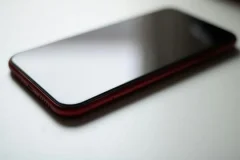- Photo by Athena Sandrini: https://www.pexels.com/photo/red-smartphone-on-white-surface-2825352/It was the end of summer—a feeling students know all too well. Backpacks were full of new notebooks and folders, lunch boxes were packed, and first-day-of-school outfits were carefully laid out, just like every year before.But something was different. Change loomed in the air when Indiana students entered schools last August. They discovered their beloved mobile electronic devices were no longer fully legal in the classroom.This ban was the result of Senate Enrolled Act 185, a bill turned into law last March that now requires school corporations and charter schools to have “wireless device policies.” This means that devices like phones and tablets are banned during instructional time with the exception of an emergency situation or permission to use them by a teacher.
When the bill was voted on last year in the Senate, it received bipartison support passing 49-0. In the House, it passed 83-8.
“Cellular devices can be distracting for anyone, especially students learning fundamental skills in the classroom,” bill author Sen. Jeff Raatz, R-Richmond, said in a February 2024 press release. “Senate Enrolled Act 185 would ensure our students are paying attention to lessons being taught in the classroom instead of their phones.”
In November 2023, Pew Research Center found that over 70% of high school teachers think distractions caused by cellphones are a major issue. That number was over 30% for educators in middle schools.
In September 2024, NPR asked Indiana students how the device ban was impacting them. They said they were less distracted during class, and one parent told the outlet she thought her son had matured because of the new law.
Teachers said students have become more social without access to their phones.
“The kids turn to each other and talk, or they start drawing on my board, or they ask me questions with their homework, and it just becomes a lot more lively, interactive environment,” Josie Defreese, an English teacher from Beech Grove, told NPR.
In January the AP reported that Indiana, California, Minnesota, Ohio, Arkansas, Louisiana, Virginia, South Carolina and Florida have statewide device restrictions in their classrooms. All other states, other than Nevada and Wyoming, have proposed bans, recommended enacting policy to create bans, or have a pilot program.
“It doesn’t matter if you live in a big city or a rural town, urban or suburban,” Kim Whitman, co-founder of the Phone Free Schools Movement, told the AP. “All children are struggling and need that seven-hour break from the pressures of phones and social media during the school day.”
Anna Cecil is a reporter for TheStatehouseFile.com, a news site powered by Franklin College journalism students. The Statehouse File is publishing this article as part of the Statehouse Reporting Project, a collaborative effort by collegiate journalism programs operating in statehouses across the country.





